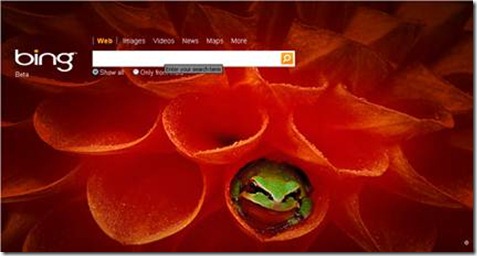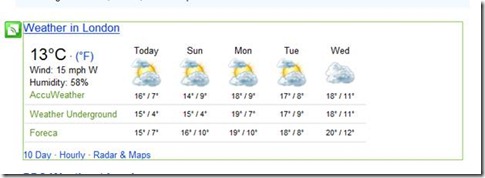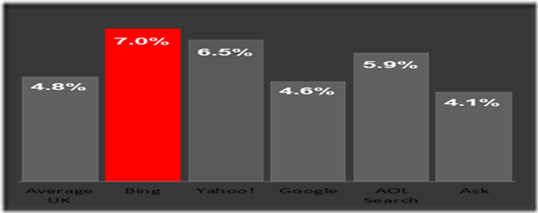Pay-per-click (PPC) for SMB #2: An introduction to Bing
A couple of weeks’ ago we published the first in a series of guest posts from Microsoft Advertising adCenter on how to get started with online advertising. Catch up with that post here Pay-per (PPC) click for SMB #1: paid and organic search, and then move on to #2 below, which is all about Microsoft’s search engine, Bing.
Albert Einstein pointed out before a search engine even existed that “Information is not Knowledge.”
Information is, in broad terms, facts or data. On the other hand, knowledge is information or opinions of value. Confusing the two is a major mistake. You want knowledge that leads to action, and that is why Microsoft set about building a redefining “Decision Engine” rather than just another search tool.
We understand that various kinds of searches require different kinds of answers and interfaces. Search is often only the beginning of a decision such as what restaurant to try or what model of car is best.
Bing’s Intuitive tools reduce the amount of clicks between searchers queries and results by finding and offering more relevant information to users. This is presented in a more organised way to simplify key tasks and help the user make important decisions, faster.
This delivers a user-focused product, and advertisers benefit from a better qualified audience and improved 'intent to buy' as a result of richer, more relevant search results.
Therefore I have broken down this blog into the benefits that Bing brings to the User and Advertiser.
Bing – A User Odyssey:
People use search engines because they want pertinent results to what they are looking for. Therefore, search engine success lives and dies by how fast the engine can refer the searcher to a relevant listing.
The “Decision Engine” is designed to reduce the number of repetitive searches through improved navigation and greater exposure of content on the Search Engine Results Page (SERP). For informational queries, Bing’s goal is to give searchers more of the information they’re looking for right on the SERP rather than force them to click on a link to decide if it is relevant or not.
The features and functionalities help users decide what the “right” content is before navigating off the SERP. For example, hovering your mouse over a natural/organic search listing displays a preview of the content on
the landing page.
Bing also categorises results thematically in an effort to group content to display on the SERP. For example, a search for “BMW 6 Series” will display for reviews, features, video, etc. Searchers clicking on the video
category will find functionality including the ability to watch a video directly on the SERP simply by moving the mouse over it. Additional features like Instant Answers provide real time answers on the SERP. Try searching for
“London weather” for example to see an up-to-date summary of weather in London now and the forecast for the next five days.
Bing’s goal of giving answers on the SERP is ideal for informational queries and will save searchers time, limiting the number of times a user searches or hits the back button after clicking on a listing.
We think you will learn to appreciate its beauty, accuracy and speed. Dare I say it, you might even come to love it as much as we do! It rewards exploration and yields pleasant surprises to users who poke around and
learn how to use the engine to get what you need.
Bing – Assisting Advertisers:
There is no denying there has been one prominent player in the search market for the last 10 years. Google’s position in the market has meant that, for most businesses, focusing exclusively on that engine in matters
of organic performance and pay-per-click was a reasonable strategy to limit your scope and still reach a high volume of buyers. However by using Bing and Yahoo you'll reach 5 million unique searchers that don't use Google – not something to miss out on. The Bing and Yahoo audience together is also 41% more likely to convert than the average UK user and 47% more likely to buy than Google users worldwide (source: NNR UK, May-October 2010)
Choice is good for advertisers, consumers and content owners. This is why Microsoft has been embracing the challenge of search and is committed to succeed.
Microsoft recognises that to get advertisers excited about opening and maintaining adCenter accounts, we must continue to improve and take query share, more importantly, to increase commercial search volume (since
commercial searches are the ones advertisers want to bid on). At time of writing, Bing’s market share is at 5.6% and growing at a rate of nearly 1% a month.
As Bing continues to gain market share, it is becoming more important than ever for businesses to pay close attention to their online marketing strategies and how Bing fits into their marketing mix.
I have already spoken about the Bing audience being better qualified, but is worth backing this up by illustrating that our Click through rates are far stronger than other search engines. The image below shows the results of independent research undertaken by NNR_UK, and every time the survey has been conducted, Bing has consistently come out on top.
Source: NNR-UK, May-October 2010
Further evidence of a focus on improved commercial results can be found if you do a search for a specific new movie or popular products such as the Windows 7 phone (Little Microsoft plug there!) have a significant mix of images, links to shopping results and paid listings.
Bing’s consumer focus is good for advertisers too, because in the long run, consumers consume ad content along with editorial content and as long as this information is relevant you have an opportunity to sell to consumers and influence their buying decisions.
Knowledge is power
I mentioned in my last blog that my career choice may affect the way I feel about online advertising. Therefore I can entirely understand why some accuse me of “Bing Bias,” because Microsoft pays my bills.
Hopefully I have proven that Bing has an important place in the Search market and within your Search marketing strategy. But if that is not enough there are lots of case studies showing great success for a number of advertisers.
To paraphrase Jay-Z (who I believe is a Bing Fan):
“If you’ve got search problems, I feel bad for you son,
I’ve got 99 problems, But Bing ain’t one”.
Get a headstart on subsequent posts - you'll find the whole 'How to get started with online advertising' series on the Microsoft Advertising adCenter site.


